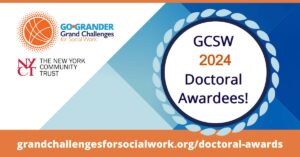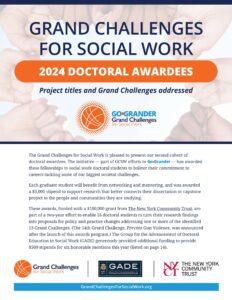 The Grand Challenges for Social Work is thrilled to announce a second cohort of doctoral awardees! These fellowships, generously funded by a $100,000 grant from The New York Community Trust, work to broaden the pipeline of social workers equipped for and committed to tackling and surmounting the Grand Challenges.
The Grand Challenges for Social Work is thrilled to announce a second cohort of doctoral awardees! These fellowships, generously funded by a $100,000 grant from The New York Community Trust, work to broaden the pipeline of social workers equipped for and committed to tackling and surmounting the Grand Challenges.
GCSW, a singular initiative that champions social progress powered by science, will provide each graduate student a mentoring program and a $3,000 stipend to support research that better connects their dissertation or capstone project to the people and communities they are studying.
“This new cohort of doctoral fellows demonstrates the commitment and innovative thinking needed to make progress in addressing the Grand Challenges for Social Work,” said Richard P. Barth, PhD, MSW, professor at the University of Maryland’s School of Social Work and Chair of the GCSW Executive Committee. “The broadening interest and activity in the grand challenge areas is expressed by these terrific doctoral students and their projects. They will inspire and lead the next generation of social workers tackling the Grand Challenges for our field and society.”
GCSW worked closely with the Group for the Advancement of Doctoral Education (GADE), and other key partners to ensure the call for applications was distributed widely and provided equal opportunity for candidates in both PhD and DSW programs through the application and review process. This year’s pool of applicants was very competitive, reflecting considerable strength in doctoral research on the Grand Challenges and expertise to help advance its mission. Because of this, GCSW also decided to select 6 honorable mention awards for notably meritorious applicants.
Please join us in celebrating the 2024 Grand Challenges Doctoral Fellows! Learn more about the 13 award-winning scholars, the Grand Challenges they are addressing, their universities and the titles of their projects here.
Yesenia Alvarez Padilla (Build Financial Capability and Assets for All), The Ohio State University: Harvesting the Fruits of their Labor: Understanding the Role of Mixed Legal Statuses in Family Financial Socialization
Nicole Capozziello (Create Social Responses to a Changing Environment), University at Buffalo: Exploring East Side Residents’ Visions of Nature: A Community-Based Case Study
Joonyoung Cho (Eradicate Social Isolation), University of Michigan: Contact Frequency with Children Following Relocation Later in Life: Do Contact Modes and Proximity to a Child Matter?
Anthony Gomez (Ensure Healthy Development for Youth), University of California, Berkeley: Positively altering the trajectory of adolescent child welfare involvement through resource investment and policy intervention
Youngjin Stephanie Hong (Reduce Extreme Economic Inequality), University of Chicago: Role of income support policies in reducing developmental gaps by socioeconomic status in early childhood to kindergarten-entry period
Barbara Mendez Campos (Eliminate Racism), Boston College: Dementia in Hispanic Groups: Factors of Severity, Diagnosis, and Treatment
Regina Nadir (Achieve Equal Opportunity and Justice), University of Southern California: Impact of Positive Student-Staff Relationships and the Social-Emotional Outcomes of Black High School Students Classified with an Emotional Disturbance Pieces to a Rose Project Summary
Hannah Scheuer (Promote Smart Decarceration), University of Washington: Individual, Family, & Social Work Perspectives to Disrupt the Foster Care to Prison Pipeline
Peter Sun (Advance Long and Productive Lives), Washington University in St. Louis: Lifecourse Patterns of Productive Engagement among Rural and Urban Older Adults
Julisa Tindall (Close the Health Gap), University of South Carolina: Judge Me Not: Exploring Black Mothers’ Perceptions of Maternal Health Services and Structural Racism in South Carolina
Anthony Traver (End Homelessness), The Ohio State University: Preventing Homelessness in Later Life Through Shallow Rental Subsidies
Nari Yoo (Harness Technology for Social Good), New York University: Unraveling Ethnic Disparities: Spatial and Virtual Access to Mental Health Services among Immigrants with Language Barriers
Qihao Zhan (Build Healthy Relationships to End Violence), University of Illinois Urbana-Champaign: Promoting Healthy Dating Relationships in the Post-Pandemic Era
GCSW also offers an honorable mention and $500 stipend to these 6 doctoral students whose applications were strongly considered for selection:
Kasandra Dodd, University of Georgia: Sex Trafficking of African American Girls Within the U.S. Child Welfare System
Fiona Doherty, The Ohio State University College of Social Work: Multisolving for Climate Resilience and Social Connectedness in Appalachian Ohio
Rita Hu, University of Michigan: The Role of Social Relationships in The Internalization and Consequence of Self-Perceptions of Aging Across the Life Span
Anna O’Dell, The University of Tennessee Knoxville: Public Schools in Crisis: Predicting Teachers Intention to Leave and Implications for Students, Learning, and Healthy Development
Jennifer Tanis, Michigan State University: State-level paid family leave: An attachment-based, economical approach to child maltreatment prevention
Melanie Yu, Rutgers, The State University of New Jersey: Refugee Reciprocity as a Critical Apparatus for Reimagining Resettlement Work: A Qualitative Examination of Refugee Reciprocity and Solidarity
About the Grand Challenges for Social Work
In 2016, the GCSW initiative was launched to harness the ingenuity, expertise, dedication, and creativity of individuals and organizations within the field of social work and beyond to champion “social progress powered by science.” The fivefold mission of the GCSW is to identify the nation’s major social challenges; gather evidence-based practice models built on rigorous science; design imaginative, effective, and culturally relevant solutions; promote policies and professional practices that lead to positive change; and advance sustainable initiatives that achieve the positive impacts for all families and communities, tribal nations, and society as a whole. It is under the fiscal umbrella of the University of Maryland Baltimore Foundation.
About the New York Community Trust
Founded in 1924, The Trust is a grantmaking foundation dedicated to improving the lives of residents of New York City and its suburbs. It brings together individuals, families, foundations, and businesses to build a better community and support nonprofits that make a difference. It applies knowledge, creativity, and resources to the most challenging issues to ensure meaningful opportunities and a better quality of life for all New Yorkers, today and tomorrow.

